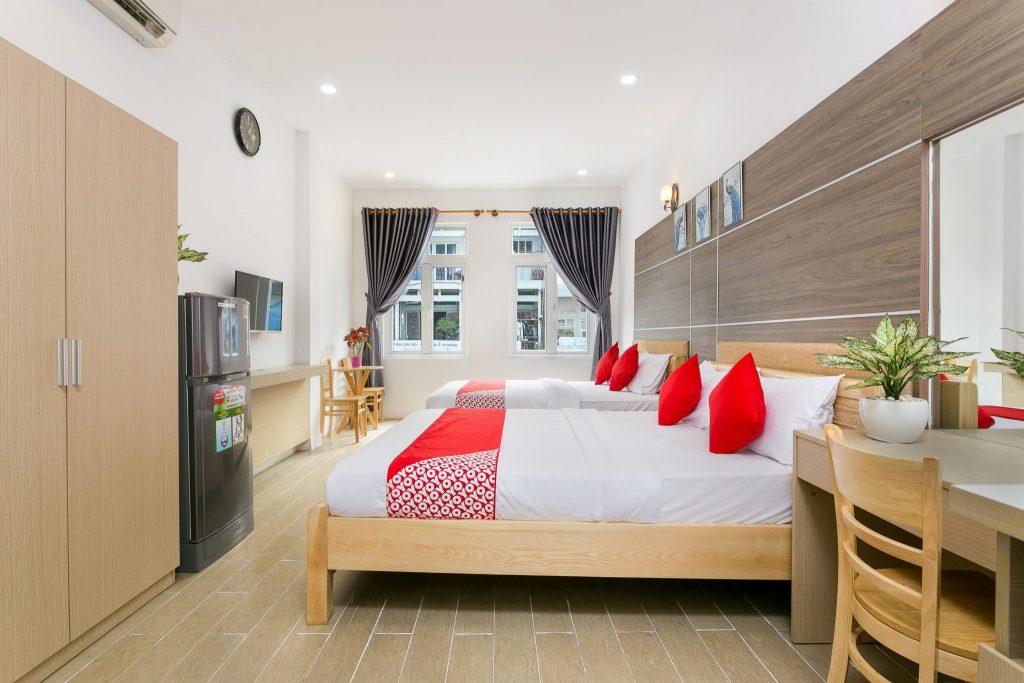Skift Take
After Indonesia, Vietnam turns out to be the next big playground in Southeast Asia for Oyo, which is targeting 20,000 rooms in the country by the end of 2020. But the more Oyo rooms multiply like rabbits, the more people want to know about the real returns on investment.
Oyo Hotels & Homes will be investing $50 million to expand in Vietnam, where it says it has opened 90 hotels with 1,500 rooms in the past three months.
That may sound incredible. Perhaps even more incredible is that its target is to grow to 20,000 rooms in 10 cities in Vietnam by the end of next year, up from six cities now, namely Hanoi, Ho Chi Minh City, Danang, Phu Quoc, Vang Tau, and Nha Trang. Oyo’s country head for Vietnam, Dushyant Dwibedy, shared the target in a statement.
At the same time it announces a Vietnam expansion, the budget hotel chain shows it has been able to multiply quickly in Indonesia and become the leading hotel chain there. In just nine months, Oyo said Indonesia counts for a total of 720 hotels with 20,000 rooms across 80 Indonesian cities in its network. In the pipeline are another 308 hotels, which are scheduled to be in operation within two months.
In other words if it can scale rapidly in Indonesia, with a $100 million investment, there is no reason it cannot repeat the feat in Vietnam.
Dwibedy attributed the quick jump to 90 hotels in Vietnam in a matter of three months to several factors.
For one, Vietnam is unique for having many “mini” hotels, that is, buildings with 20 to 40 rooms, often even smaller than 20 rooms. Compared to budget hotels in Indonesia, Malaysia, or the Philippines, these properties have a greater need to spread their fixed costs through the Oyo network, while the asset owners “are more open to experiment with technology,” he told Skift.
What’s more, having entered Indonesia, Malaysia, and the Philippines, Oyo now has Southeast Asia learnings. The support of its teams in the region was invaluable in identifying hotel conversions, he added.
Oyo boasts that it can identify and onboard properties within 10 days, renovate them in record time, create demand across offline and online channels, and use technology to raise operational efficiencies. With such claims, plus funds to put skin in the game where needed, it is plausible for the chain to expand aggressively.
But skepticism about Oyo, which largely surrounds operational and financial challenges, is growing as rapidly as the rate at which the chain is adding rooms globally.
Dwibedy fends off the skeptics. Oyo achieves an average room rate of $17 in Vietnam currently, he shared. While this may seem low, the other side of the revenue coin, occupancy, rises dramatically with an Oyo franchise. He cited the Oyo Center Danang as an example of occupancy rising 150 percent after a full-scale Oyo redesign and branding. This, along with Oyo’s suite of technology tools such as pricing and revenue management, resulted in a 50 percent increase in revenue in three months for the hotel owner, he said.
“We’re able to show such case studies to asset owners, which helped with the conversions of properties to Oyo in Vietnam in the past three months,” Dwibedy said.
The question however remains whether Oyo’s claim of doubling revenues will translate to profitability for owners and could be achieved across the board for its franchisees.
Competition is also getting more fierce in Vietnam. The country does not lack good budget hotels. There’s everything from guesthouses and mini hotels to boutique hotels and hostels, run by enterprising Vietnamese who want a share of the country’s booming tourism industry.
Homesharing is also growing massively, as reported by Skift, adding by now 40,000 active listings to Vietnam’s accommodation pool. On top of this is an impending 40 percent increase in hotel room supply, although these rooms are largely in the three-star to five-star segments.
Demand growth for Vietnam is already slowing. Last year saw a 20 percent increase in arrivals to 15.5 million, compared to a 29 percent growth in 2017. This has been partly attributed to a slowdown in Chinese visitors who have wider choices as more destinations ease visa rules for them.
Oyo is likely to repeat the feat in Vietnam, but more than ever, it will need to show not just supply expansion but the returns on investment for asset owners — and itself.
Have a confidential tip for Skift? Get in touch
Tags: budget hotels, oyo, southeast asia, vietnam
Photo credit: OYO K9 Central Hotel, Ho Chi Minh City, Vietnam. Oyo Hotels and Homes
